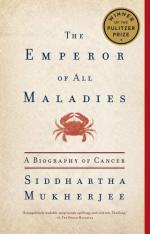
|
| Name: _________________________ | Period: ___________________ |
This test consists of 5 short answer questions, 10 short essay questions, and 1 (of 3) essay topics.
Short Answer Questions
1. "The Emperor of all Maladies" begins with the tale of Carla Reed, a _______ year old kindergarten teacher from Ipswich, MA.
2. Who worked to keep cancer research out of trouble, and to do so he developed a consortium to keep doctors, scientists and health facilities from working at cross purposes?
3. In the shadow of Albert's death, Mary Lasker's cancer campaign took on a _______________ tone.
4. The parcel Farber was expecting contained aminopterin, a __________ crystalline chemical that Farber hoped could be used in deterring the growth of childhood leukemia.
5. Mukherjee met with Carla. They discussed the survival rate of leukemia. At one time, there was almost no chance that Carla could have been able to survive the onset of the leukemia. With the advent of modern medicine and new treatments, Carla had a ______ chance of surviving the disease.
Short Essay Questions
1. What important drugs came out in the 1940s and 1950s? How are these important to us today?
2. On what two fundamental tenets is biology based? Explain these tenets.
3. Describe the New York Times letter to Richard Nixon. How could this tactic be useful today?
4. What did FDR do to fight cancer? What caused support of cancer research to wane? Why?
5. How was the chemotherapy ward a battle ground in the 1970s?
6. What was the significance of using MOPP in the treatment of breast cancer?
7. Describe Bennett's patient. How was John Bennett's diagnosis logical?
8. Why was Farber fortunate to have lived in the right time, and also died at the right time?
9. Describe the drug and cancer lists of Canellas and Frei. How is this significant?
10. What did Moya Cole think of Halsted's theories? Why?
Essay Topics
Write an essay for ONE of the following topics:
Essay Topic 1
"Farber's Gauntlet" details the story of Robert Sandler.
Part 1) Who was Robert Sandler? How is his story important? How is it connected to the study of cancer and disease?
Part 2) Why is importance placed on this case? What does this say about the fight against cancer? Is this same mentality seen regarding other diseases? Why or why not?
Part 3) Would doctors today see Robert Sandler's case as some sort of success, if he was a patient today? Why or why not? What does this say about cancer research today?
Essay Topic 2
Cancer is not the only disease discussed in this book.
Part 1) What are two other diseases discussed in this book? Describe these two diseases. What is the purpose of having these diseases discussed in this book?
Part 2) How do these diseases compare to cancer? Which disease do you find to be the most threatening to the American people? Why?
Part 3) What similarities can be found among various diseases including all that are discussed in this book? How is this important?
Essay Topic 3
In 1969, the New York Times published a letter to Richard Nixon.
Part 1) What did this letter say? Why did they write this open letter? How did Nixon respond? Why did he respond in this way? Would he have responded in this way if it had been a private letter sent to him? Why or why not?
Part 2) What does this letter reveal about the American public at the time it was written? What was their view of cancer? How had this changed from the importance, or lack thereof, of cancer research in previous years? Why?
Part 3) How important is cancer research today? Does the American public feel about cancer and cancer research the same as they did in 1969? Why or why not? How might Americans today use an open letter format to attract the attention of our president? What issues are important today? Why?
|
This section contains 1,258 words (approx. 5 pages at 300 words per page) |

|




